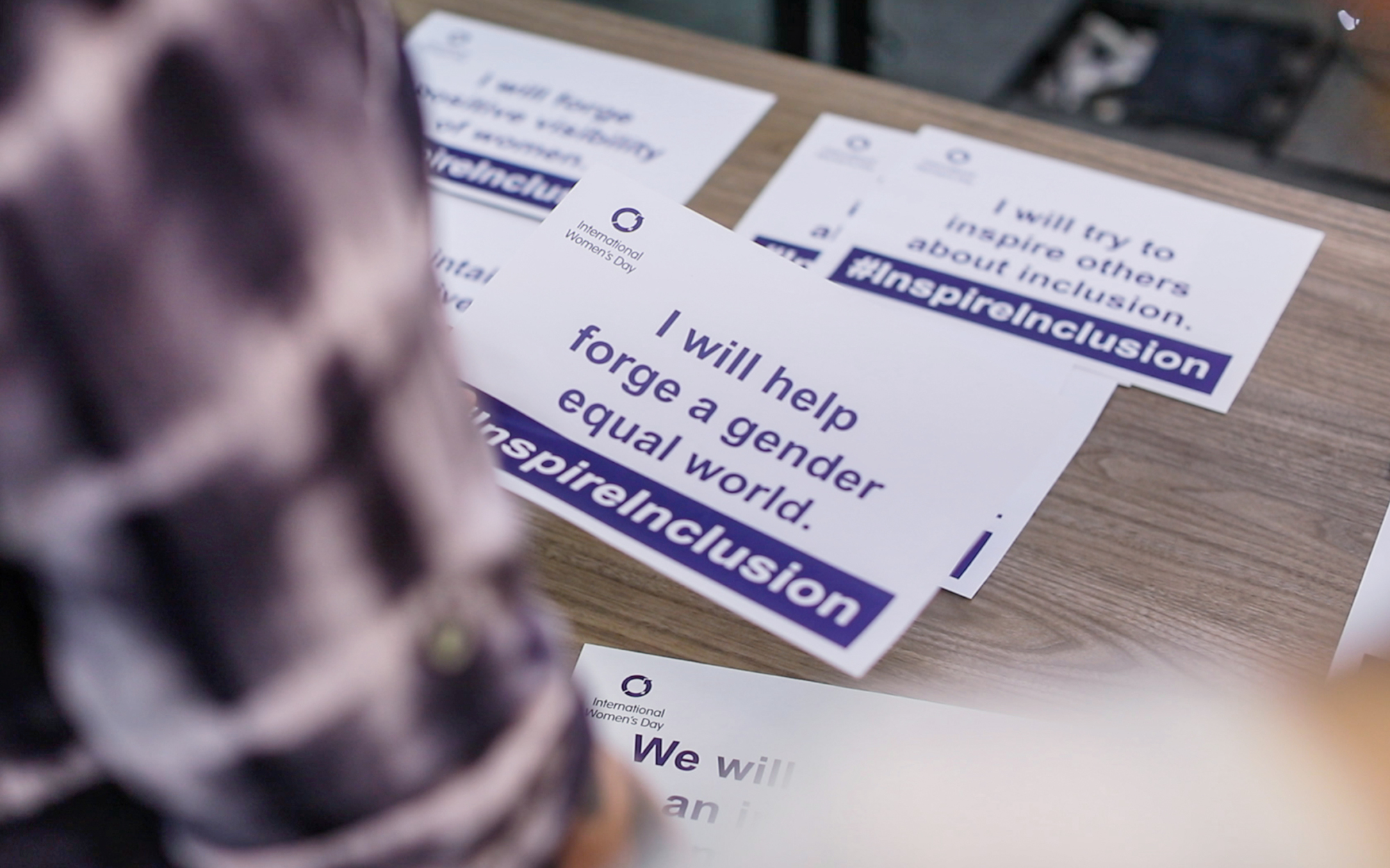08 March 2024
2024’s International Women's Day theme is “inspire inclusion” – let’s take a look at how companies in FM and the built environment are marking the day.
Compass Launches Work Maternity Jacket
To coincide with International Women’s Day 2024, catering and support services company Compass Group has launched a new staff uniform item specifically to support women.
The maternity jacket, designed by Lynda Yong and Compass Group’s Women in Food community, has been produced to support pregnancy, feeding or pumping, perimenopause and menopause. The jacket is made from lightweight material that helps dissipate heat, maintaining the wearer’s body temperature at 37.5oC, and an elasticated lining allows for fluctuations in weight.

Picture: a photograph of two people seated at a table, both wearing white catering jackets. The person on the right is wearing the new Compass jacket, looking down at her stomach. Image Credit: Compass Group
Leanne Ryan, Chef, Restaurant Associates, who tried the jacket whilst pregnant and is currently wearing it postpartum, said: “The kitchen is a challenging working environment at the best of times, but especially when you are heavily pregnant. Having this jacket, which has been designed by our Compass female chefs, feels like women are being listened to, respected and supported in an industry that has been so male dominated for such a long time.”
The jacket will be available to Compass’ UK & Ireland staff from April 2024, and the company intends to roll out the garment to its staff globally.
"It’s not about a party to thank women just for the one day – this is a long-term commitment from people of all genders to collaborate on a better future for women. What a way to celebrate!”
–Susan Mason
UK & Ireland IT Director and Women’s Impact Group Member, ABM
ABM Launches First Women’s Impact Group
FM provider ABM has launched its first Women’s Impact Group in the UK and Ireland, aiming to promote a culture that values the contribution and leadership of women at ABM while advancing the understanding of what an equitable and inclusive work environment for women should look like.
The group will partner with the executive steering committee to identify opportunities for women at ABM to enter leadership roles and create avenues that support mentoring, recruiting, and development of women within the business.
Susan Mason, UK & Ireland IT Director and Women’s Impact Group member said: “The enthusiasm which this group has been met with has been fantastic. This is a historically male-dominated industry and so it is refreshing to see the encouragement and support that has been given to a group set on making incremental change.
“Launching it on International Women’s Day is a meaningful way to participate. It’s not about a party to thank women just for the one day – this is a long-term commitment from people of all genders to collaborate on a better future for women. What a way to celebrate!”
Veriforce CHAS Outlines Five Ways Construction Workplaces Can Support Women
Nyaisha Sullivan, Construction Lead at Veriforce CHAS, explores five key strategies to make construction workplaces more inclusive for women:
Review Flexible Working Policies
An impactful way to attract and retain women in construction is to reevaluate and expand flexible working policies which might include measures such as remote working and flexible hours. Traditionally, construction work has been associated with rigid schedules and on-site presence but research led by Build UK and Timewise demonstrated that flexible working can be implemented without negatively affecting budgets or delivery.
What’s more, from April 6, 2024 new flexible working regulations will grant employees the right to request flexible work arrangements from the beginning of their employment rather than having to wait 26 weeks with other changes around flexible working rules set to follow. That means now's a good time to review flexible working policies if you haven't done so already. For more ideas on how to improve flexible work arrangements, see Timewise’s Ten Point Action Plan.
Ensure Workers Have Access to Inclusive PPE
Personal Protective Equipment (PPE) is a critical aspect of construction work, and it's essential that PPE is designed with inclusivity in mind. Historically, PPE has been designed primarily for male bodies, leading to discomfort and safety concerns for women. Construction companies should invest in and provide PPE tailored to the anatomical differences of female workers. Better still, companies can involve workers in the trial and selection of PPE and seek out suppliers who offer support in finding workers protective products that fit. A list of inclusive suppliers can be found here: ppethatfits.com/directory/
Review the Provision of Welfare Facilities
Construction sites often lack adequate welfare facilities, and this can disproportionately affect women. By conducting a thorough review of existing facilities, businesses can identify areas for improvement, ensuring that women have access to clean and safe bathrooms, changing rooms, and rest areas. Addressing these concerns not only promotes inclusivity but also contributes to the overall wellbeing and satisfaction of the workforce. For further information, see the HSE’s latest guidance on the provision of welfare facilities on construction sites.
Implement a Menopause Policy
The menopausal transition is a natural phase of life for many women, and addressing its challenges is crucial for creating an inclusive workplace. Construction companies can introduce menopause policies that include provisions for flexible working hours, temperature control on construction sites, and support networks for women experiencing menopausal symptoms. By normalising conversations around menopause and providing the necessary support, companies can foster a more inclusive environment for female workers. The CIPD has a free guide on managing menopause at work for people managers.
Consult Women on What They Need
Perhaps the most fundamental step towards creating an inclusive workplace is actively seeking input from female employees. Conducting surveys, focus groups, and one-on-one discussions can provide valuable insights into women's specific needs and challenges in the construction industry. By involving women in decision-making processes, construction companies can tailor their policies and practices to address the unique concerns of their female workforce.
Picture: a photograph showing a table with International Women's Day posters on it. The poster says "I will help force a gender equal world." Image Credit: ABM
Article written by Ella Tansley | Published 08 March 2024
Share
Related Articles
Housebuilder Celebrates Women in Construction on International Women’s Day 2023
Cannock-based housebuilder Jessup Partnerships is looking to encourage talented women into the workforce and has produced a video to mark International Women’s Day...
Read Full Article
We Still Need ‘Rallying Cry Events’ to Address Gender Imbalance, says ISS CEO
Liz Benison, CEO at ISS UK & Ireland, spoke about gender-balanced workplaces to mark International Women’s Day.
Gender balance is one of the five pillars...
Read Full Article
Spotlight Interview – Jenna Pollock
Jenna Pollock is Divisional Director at ABM, responsible for Scotland and Northern Ireland.
Jenna has 16 years of experience in the FM industry,...
Read Full Article
Why Do We Need International Women's Day?
ThisWeekinFM collates thoughts from women in our industry and key statistics to demonstrate why action towards equality for women is needed in the...
Read Full Article
FM Celebrates International Women’s Day 2021
What is the facilities management sector doing to celebrate this year’s International Women’s Day?
International Women’s Day is an annual...
Read Full Article
Women Who Inspire in FM – International Women’s Day
This International Women’s Day, ThisWeekinFM asked those on the built environment frontline to reveal their top female role models who are making a positive...
Read Full Article
Spotlight Interview – Emma McLaughlin-Edwards | Constructing Rainbows
Is ED&I dropping down the FM agenda? We met with Emma McLaughlin-Edwards from Constructing Rainbows to find out.
Emma is an equality, diversity and inclusion...
Read Full Article
Spotlight Interview – Samantha West | Ok To Be Different
Samantha West is an experienced FM Commercial Director who uses her lived experience as a transgender woman to help businesses improve their Equality Diversity and...
Read Full Article
Spotlight Interview – Satia Rai | IPSA
Satia Rai joins ThisWeekinFM to discuss her passion for the private security industry, her activism and career highlights.
Satia, who is the CEO of IPSA, began her...
Read Full Article
Championing EDI – How IPSA is Paving the Way for Inclusivity and Diversity in the Security Sector
Satia Rai, CEO at IPSA & Head of Belonging at Securitas UK, outlines why it's essential for the security industry to “reflect who it...
Read Full Article


.gif)
.gif)
.gif)








.png)

.png)
